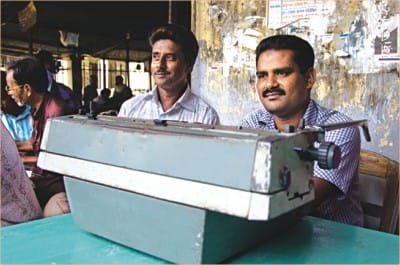Typewriter <i>Men </i>

Yusuf and Babul. Photo: Ihtisham Kabir
Behind Dhaka's Court Kachari lies the bastion of a once-powerful tool of civilization: the typewriter. Several dozen typists here serve clients at the Judge Court and several government offices.
I stop by one day for a chat with Babul Akhtar who types in Bangla. We are joined by Abu Yusuf, English typist. Both have been typing for approximately twenty years.
After introductions and niceties, I come to the point: “What can typists do that cannot be done with a computer?”
“Many things,” says Babul. “For example, one page of a large multi-page document may need to be changed or corrected. Small changes are difficult and expensive with computers.”
How much does it cost? “We charge from ten to twenty taka per page, depending on the words,” replies Yusuf.
I look at the Bangla typewriter. It is a Munir Optima, based on the Bangla keyboard invented in 1965 by Dr. Munier Choudhury, the Bengali writer and intellectual who was killed in 1971. It looks well-used.
“What do you do if it breaks?” I ask. “Not a problem - there is a mechanic who comes by once a month and services these. Ribbons are also available nearby,” answers Babul.
They both learned typing at a nearby vocational school which no longer exists. “How fast can you type?” I ask. “I clocked up to sixty words per minute,” says Yusuf. Babul says Bangla typing is a little slower, but he has exceeded 40 words per minute.
Babul and Yusuf are part of a typist group serving the District Commissioner's and the Magistrate's offices. They type rental agreements, automobile selling papers, and affidavits. They also fill out official forms.
Further up the street sit more typists serving the Court clients. They usually deal with heavyweight legal materiel, such as deeds and documents drawn up on stamped paper.
On a good day Babul and Yusuf type 300 sheets. But today, Thursday, is a slow day, and they have types a few sheets each. Sundays are busiest.
How many typewriters remain in Dhaka? They guess about 200, most of which are in this area. There are some in the “Nokolkhana” at the High Court, where certified copies of legal deeds and documents are made. There are a few individual typists at city hubs such as Farm Gate.
Their operating costs appear reasonable: used Bangla typewriters cost around 1500-2000 Taka. New ones - if you can find them - can cost ten times as much.
Capital costs prevent many typists from migrating to computers. This is an excellent opportunity for an NGO to assist with career changes.
I observe their setup before leaving: typewriter, paper, carbon paper. But something is missing. Where is white-out, the white ink used to wipe out mistakes?
“Oh, you cannot buy that here anymore. Besides, official documents do not accept corrections like that. So we have to get it right the first time,” said Yusuf.
Get it right the first time. Now, how many of us computer-people can claim that?

 For all latest news, follow The Daily Star's Google News channel.
For all latest news, follow The Daily Star's Google News channel. 



Comments